介词2
- 格式:doc
- 大小:37.00 KB
- 文档页数:4
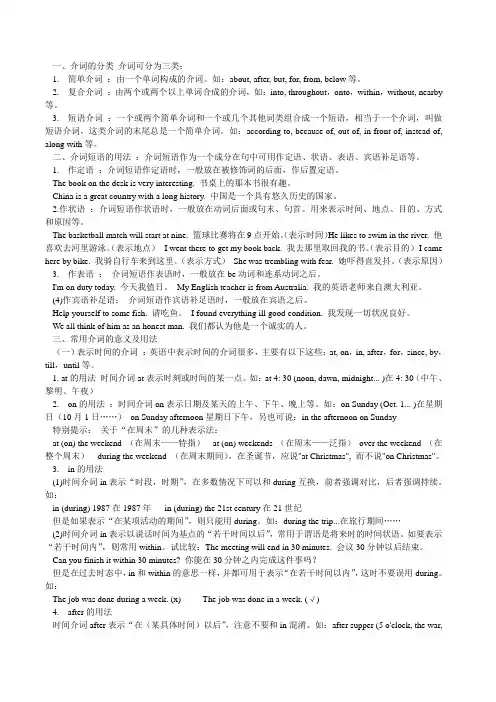
一、介词的分类介词可分为三类:1.简单介词:由一个单词构成的介词。
如:about, after, but, for, from, below等。
2.复合介词:由两个或两个以上单词合成的介词,如:into, throughout,onto,within,without, nearby 等。
3.短语介词:一个或两个简单介词和一个或几个其他词类组合成一个短语,相当于一个介词,叫做短语介词,这类介词的末尾总是一个简单介词。
如:according to, because of, out of, in front of, instead of, along with等。
二、介词短语的用法:介词短语作为一个成分在句中可用作定语、状语、表语、宾语补足语等。
1.作定语:介词短语作定语时,一般放在被修饰词的后面,作后置定语。
The book on the desk is very interesting. 书桌上的那本书很有趣。
China is a great country with a long history. 中国是一个具有悠久历史的国家。
2.作状语:介词短语作状语时,一般放在动词后面或句末、句首。
用来表示时间、地点、目的、方式和原因等。
The basketball match will start at nine. 篮球比赛将在9点开始。
(表示时间)He likes to swim in the river. 他喜欢去河里游泳。
(表示地点)I went there to get my book back. 我去那里取回我的书。
(表示目的)I came here by bike. 我骑自行车来到这里。
(表示方式)She was trembling with fear. 她吓得直发抖。
(表示原因)3.作表语:介词短语作表语时,一般放在be动词和连系动词之后。
I'm on duty today. 今天我值日。
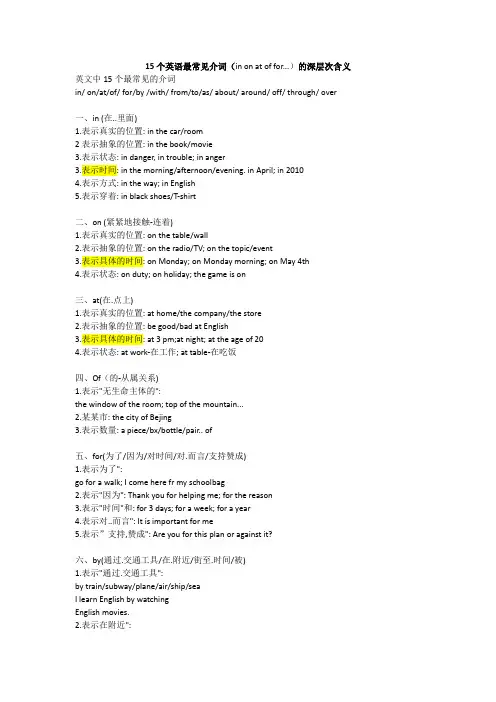
15个英语最常见介词(in on at of for...)的深层次含义英文中15个最常见的介词in/ on/at/of/ for/by /with/ from/to/as/ about/ around/ off/ through/ over一、in (在..里面)1.表示真实的位置: in the car/room2表示抽象的位置: in the book/movie3.表示状态: in danger, in trouble; in anger3.表示时间: in the morning/afternoon/evening. in April; in 20104.表示方式: in the way; in English5.表示穿着: in black shoes/T-shirt二、on (紧紧地接触-连着)1.表示真实的位置: on the table/wall2.表示抽象的位置: on the radio/TV; on the topic/event3.表示具体的时间: on Monday; on Monday morning; on May 4th4.表示状态: on duty; on holiday; the game is on三、at(在.点上)1.表示真实的位置: at home/the company/the store2.表示抽象的位置: be good/bad at English3.表示具体的时间: at 3 pm;at night; at the age of 204.表示状态: at work-在工作; at table-在吃饭四、Of(的-从属关系)1.表示"无生命主体的":the window of the room; top of the mountain...2.某某市: the city of Bejing3.表示数量: a piece/bx/bottle/pair.. of五、for(为了/因为/对时间/对.而言/支持赞成)1.表示为了":go for a walk; I come here fr my schoolbag2.表示"因为": Thank you for helping me; for the reason3.表示"时间"和: for 3 days; for a week; for a year4.表示对..而言": It is important for me5.表示”支持,赞成": Are you for this plan or against it?六、by(通过.交通工具/在.附近/街至.时间/被)1.表示"通过.交通工具":by train/subway/plane/air/ship/seaI learn English by watchingEnglish movies.2.表示在附近":a table by the window; the house is by the lake3.表示"截至到..时间":by the end of next week; by 20194.表示"被(被动语态)":English is spoken by people all over the world.七、with (伴随)1.表示"和.起":go with:play with;make friends with;cooperate with2.表示"携有,带有":a county with a long history; a house with a big garden3.表示..工具:cut the apple with the knife4.表示"伴随":with the development of the society;with the help of my teacher;I don't have any cash with me.八、from (远离)1.表示"来自":I am/come from China;a gift from my best friend;a man from America2.由"远离"来记短语:stop/prevent/keep sb from doing sth阻止某人做某事be away from...远离...be different from与.不同be absent from缺席....how far is it from here?它离这远The paper is made from wood.这纸是由木头制成的3.表示..到": from...to...由"指向"来理解下列用法:The road leads to Paris.这条路通往巴黎Smoking is harmful to your health.吸烟有害健康the answer to the question.这个问题的答案九、to (指向..)contribute to对..做贡献on one's way to... 在某人去某地的路上belong to属于..be used to doing sth习惯于做某事lead to...导致十、as作为He works as a tour guide.他作为导游工作。
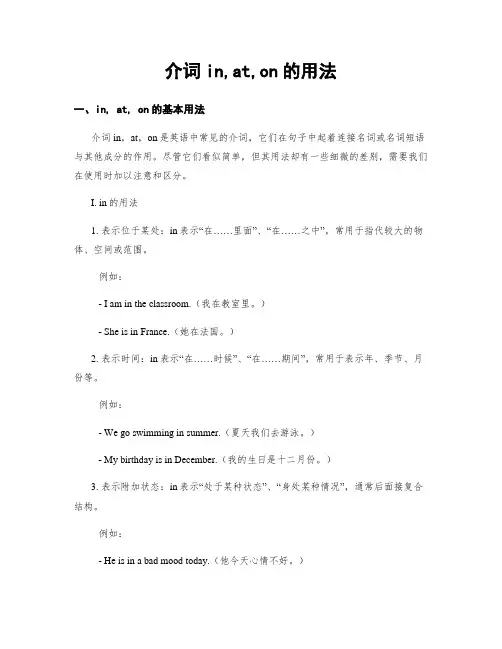
介词in,at,on的用法一、in, at, on的基本用法介词in,at,on是英语中常见的介词,它们在句子中起着连接名词或名词短语与其他成分的作用。
尽管它们看似简单,但其用法却有一些细微的差别,需要我们在使用时加以注意和区分。
I. in的用法1. 表示位于某处:in表示“在……里面”、“在……之中”,常用于指代较大的物体、空间或范围。
例如:- I am in the classroom.(我在教室里。
)- She is in France.(她在法国。
)2. 表示时间:in表示“在……时候”、“在……期间”,常用于表示年、季节、月份等。
例如:- We go swimming in summer.(夏天我们去游泳。
)- My birthday is in December.(我的生日是十二月份。
)3. 表示附加状态:in表示“处于某种状态”、“身处某种情况”,通常后面接复合结构。
例如:- He is in a bad mood today.(他今天心情不好。
)- The company is in financial trouble.(公司陷入了财务困境。
)II. at的用法1. 表示位置:at表示“在……地方”、“在某处”,常用于指代较小范围的地点、位置或具体场所。
例如:- She is waiting for you at the bus stop.(她在公交车站等你。
)- I will meet you at the cinema.(我会在电影院见你。
)2. 表示时间:at表示“在……具体时间点”,通常用于某一具体时刻、钟点或时间段。
例如:- The meeting starts at 9 a.m.(会议在上午九点开始。
)- I usually have dinner at 6:30 p.m.(我通常六点半吃晚饭。
)3. 表示动作进行的状态:at表示“正在进行某个动作”、“忙着做某事”,通常用于表示举止、动作进行中。
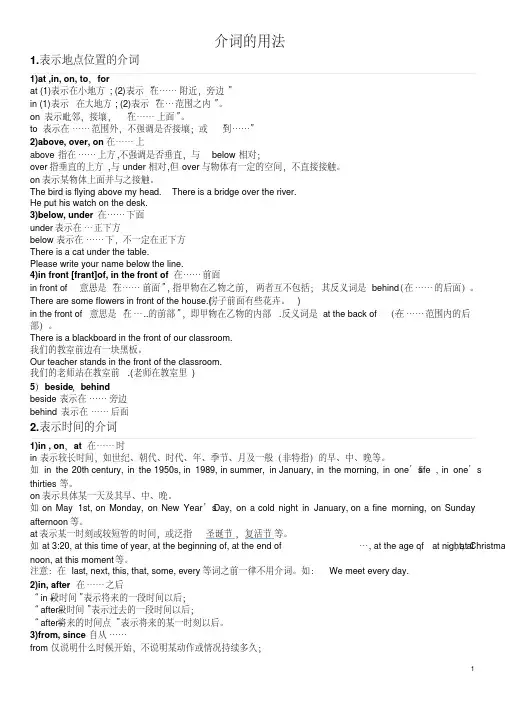
介词的用法1.表示地点位置的介词1)at ,in, on, to,forat (1)表示在小地方; (2)表示“在……附近,旁边”in (1)表示在大地方; (2)表示“在…范围之内”。
on 表示毗邻,接壤,“在……上面”。
to 表示在……范围外,不强调是否接壤;或“到……”2)above, over, on 在……上above 指在……上方,不强调是否垂直,与below相对;over指垂直的上方,与under相对,但over与物体有一定的空间,不直接接触。
on表示某物体上面并与之接触。
The bird is flying above my head. There is a bridge over the river.He put his watch on the desk.3)below, under 在……下面under表示在…正下方below表示在……下,不一定在正下方There is a cat under the table.Please write your name below the line.4)in front [frant]of, in the front of在……前面意思是“在……前面”,指甲物在乙物之前,两者互不包括;其反义词是behind(在……的后面)。
in front of…There are some flowers in front of the house.(房子前面有些花卉。
)in the front of 意思是“在…..的前部”,即甲物在乙物的内部.反义词是at the back of…(在……范围内的后部)。
There is a blackboard in the front of our classroom.我们的教室前边有一块黑板。
Our teacher stands in the front of the classroom.我们的老师站在教室前.(老师在教室里)5)beside,behindbeside 表示在……旁边behind 表示在……后面2.表示时间的介词1)in , on,at 在……时in表示较长时间,如世纪、朝代、时代、年、季节、月及一般(非特指)的早、中、晚等。
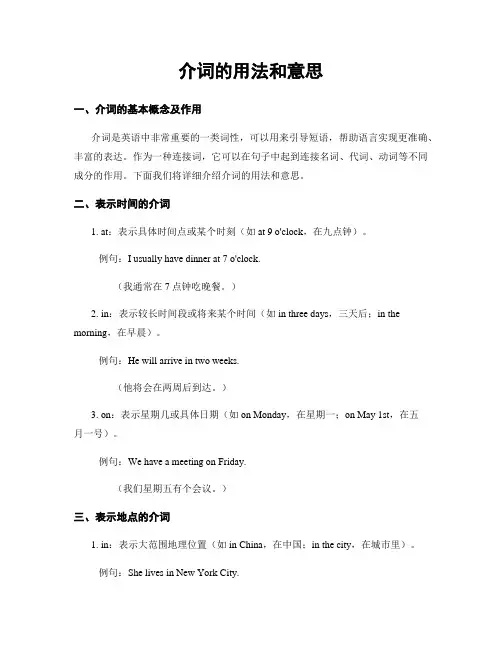
介词的用法和意思一、介词的基本概念及作用介词是英语中非常重要的一类词性,可以用来引导短语,帮助语言实现更准确、丰富的表达。
作为一种连接词,它可以在句子中起到连接名词、代词、动词等不同成分的作用。
下面我们将详细介绍介词的用法和意思。
二、表示时间的介词1. at:表示具体时间点或某个时刻(如at 9 o'clock,在九点钟)。
例句:I usually have dinner at 7 o'clock.(我通常在7点钟吃晚餐。
)2. in:表示较长时间段或将来某个时间(如in three days,三天后;in the morning,在早晨)。
例句:He will arrive in two weeks.(他将会在两周后到达。
)3. on:表示星期几或具体日期(如on Monday,在星期一;on May 1st,在五月一号)。
例句:We have a meeting on Friday.(我们星期五有个会议。
)三、表示地点的介词1. in:表示大范围地理位置(如in China,在中国;in the city,在城市里)。
例句:She lives in New York City.(她住在纽约市。
)2. at:表示小范围地理位置(如at the park,在公园里;at the bus stop,在车站)。
例句:I met her at the airport.(我在机场遇见了她。
)3. on:表示具体表面(如on the table,在桌子上;on the wall,在墙上)。
例句:The book is on the shelf.(书在书架上。
)四、表示方式的介词1. by:表示通过某种方式或交通工具(如by car,乘坐汽车;by email,通过邮件)。
例句:I usually go to work by subway.(我通常乘坐地铁去上班。
)2. with:表示使用某物或与某人一同完成某事(如with a pen,用钢笔;with my friends,和我的朋友一起)。
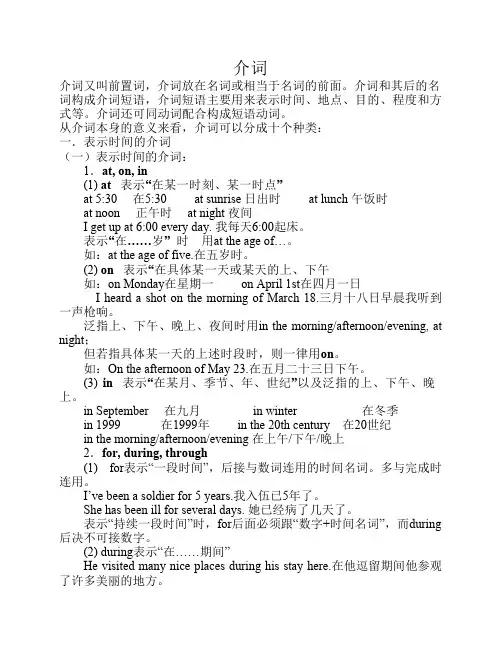
介词介词又叫前置词,介词放在名词或相当于名词的前面。
介词和其后的名词构成介词短语,介词短语主要用来表示时间、地点、目的、程度和方式等。
介词还可同动词配合构成短语动词。
从介词本身的意义来看,介词可以分成十个种类:一.表示时间的介词(一)表示时间的介词: 1.at, on, in (1) at 表示“在某一时刻、某一时点” at 5:30 在5:30 at sunrise 日出时 at lunch 午饭时 at noon 正午时 at night 夜间 I get up at 6:00 every day. 我每天6:00起床。
表示“在……岁” 时用at the age of…。
如:at the age of five.在五岁时。
(2) on 表示“在具体某一天或某天的上、下午如:on Monday在星期一 on April 1st在四月一日 I heard a shot on the morning of March 18.三月十八日早晨我听到一声枪响。
泛指上、下午、晚上、夜间时用in the morning/afternoon/evening, at night;但若指具体某一天的上述时段时,则一律用on。
如:On the afternoon of May 23.在五月二十三日下午。
(3)in 表示“在某月、季节、年、世纪”以及泛指的上、下午、晚上。
in September 在九月 in winter 在冬季 in 1999 在1999年 in the 20th century 在20世纪 in the morning/afternoon/evening 在上午/下午/晚上 2.for, during, through (1) for表示“一段时间”,后接与数词连用的时间名词。
多与完成时连用。
I’ve been a soldier for 5 years.我入伍已5年了。
She has been ill for several days. 她已经病了几天了。
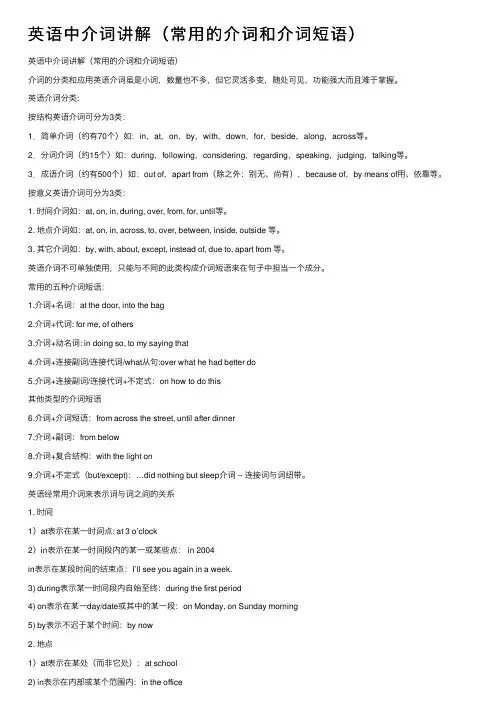
英语中介词讲解(常⽤的介词和介词短语)英语中介词讲解(常⽤的介词和介词短语)介词的分类和应⽤英语介词虽是⼩词,数量也不多,但它灵活多变,随处可见,功能强⼤⽽且难于掌握。
英语介词分类:按结构英语介词可分为3类:1.简单介词(约有70个)如:in,at,on,by,with,down,for,beside,along,across等。
2.分词介词(约15个)如:during,following,considering,regarding,speaking,judging,talking等。
3.成语介词(约有500个)如:out of,apart from(除之外:别⽆、尚有),because of,by means of⽤、依靠等。
按意义英语介词可分为3类:1. 时间介词如:at, on, in, during, over, from, for, until等。
2. 地点介词如:at, on, in, across, to, over, between, inside, outside 等。
3. 其它介词如:by, with, about, except, instead of, due to, apart from 等。
英语介词不可单独使⽤,只能与不同的此类构成介词短语来在句⼦中担当⼀个成分。
常⽤的五种介词短语:1.介词+名词:at the door, into the bag2.介词+代词: for me, of others3.介词+动名词: in doing so, to my saying that4.介词+连接副词/连接代词/what从句:over what he had better do5.介词+连接副词/连接代词+不定式:on how to do this其他类型的介词短语6.介词+介词短语:from across the street, until after dinner7.介词+副词:from below8.介词+复合结构:with the light on9.介词+不定式(but/except):…did nothing but sleep介词 -- 连接词与词纽带。

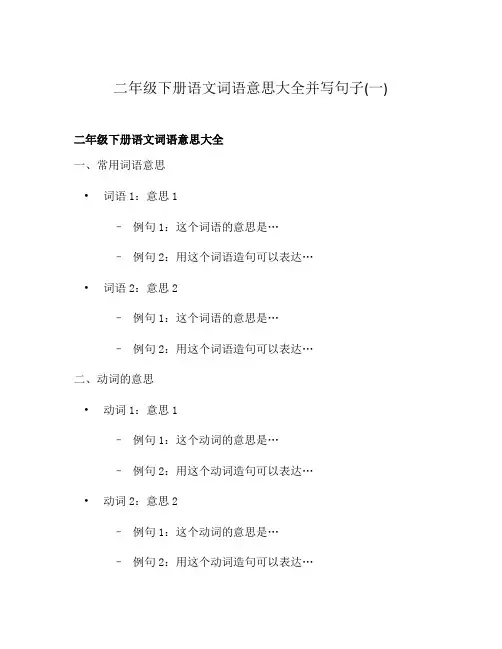
二年级下册语文词语意思大全并写句子(一)二年级下册语文词语意思大全一、常用词语意思•词语1:意思1–例句1:这个词语的意思是…–例句2:用这个词语造句可以表达…•词语2:意思2–例句1:这个词语的意思是…–例句2:用这个词语造句可以表达…二、动词的意思•动词1:意思1–例句1:这个动词的意思是…–例句2:用这个动词造句可以表达…•动词2:意思2–例句1:这个动词的意思是…–例句2:用这个动词造句可以表达…三、形容词的意思•形容词1:意思1–例句1:这个形容词的意思是…–例句2:用这个形容词造句可以形容…•形容词2:意思2–例句1:这个形容词的意思是…–例句2:用这个形容词造句可以形容…四、名词的意思•名词1:意思1–例句1:这个名词的意思是…–例句2:这个名词可以指代…•名词2:意思2–例句1:这个名词的意思是…–例句2:这个名词可以指代…五、副词的意思•副词1:意思1–例句1:这个副词的意思是…•副词2:意思2–例句1:这个副词的意思是…–例句2:用这个副词造句可以表示…六、连词的意思•连词1:意思1–例句1:这个连词的意思是…–例句2:用这个连词造句可以表示…•连词2:意思2–例句1:这个连词的意思是…–例句2:用这个连词造句可以表示…七、介词的意思•介词1:意思1–例句1:这个介词的意思是…–例句2:用这个介词造句可以表示…•介词2:意思2–例句1:这个介词的意思是…八、其他词语的意思•词语1:意思1–例句1:这个词语的意思是…–例句2:用这个词语造句可以表达…•词语2:意思2–例句1:这个词语的意思是…–例句2:用这个词语造句可以表达…注:请根据具体情况替换词语、意思和例句内容。
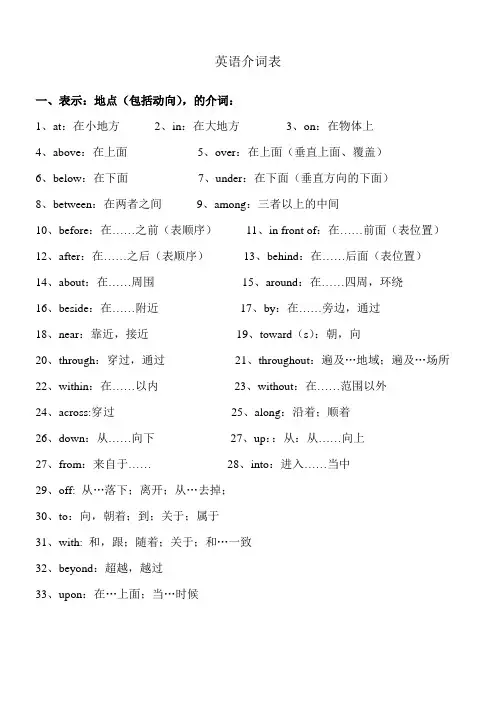
英语介词表一、表示:地点(包括动向),的介词:1、at:在小地方2、in:在大地方3、on:在物体上4、above:在上面5、over:在上面(垂直上面、覆盖)6、below:在下面7、under:在下面(垂直方向的下面)8、between:在两者之间9、among:三者以上的中间10、before:在……之前(表顺序)11、in front of:在……前面(表位置)12、after:在……之后(表顺序)13、behind:在……后面(表位置)14、about:在……周围15、around:在……四周,环绕16、beside:在……附近17、by:在……旁边,通过18、near:靠近,接近19、toward(s):朝,向20、through:穿过,通过21、throughout:遍及…地域;遍及…场所22、within:在……以内23、without:在……范围以外24、across:穿过25、along:沿着;顺着26、down:从……向下27、up::从:从……向上27、from:来自于……28、into:进入……当中29、off: 从…落下;离开;从…去掉;30、to:向,朝着;到;关于;属于31、with: 和,跟;随着;关于;和…一致32、beyond:超越,越过33、upon:在…上面;当…时候1、at:在……几点2、in:在……一段时间3、on:在……一天4、by:在……以前5、after:在……以后(从过去,某时刻开始)6、in:在……以后(从现在开始)7、since:从……时(时间点)8、for:从……时(时间段)9、during:在……期间10、till:直到11、until:直到……时,到……为止12、about:大约……时候13、after:在…时候之后14、before:在…时候前面15、from:从……时候16、over:……时候结束17、past:超过……时候18、through:经过……时候19、throughout:自始至终;在…期间;遍及…地域;遍及…场所三、表示:除去,的介词1、besides:除……之外,还有2、but:除去3、except:除……之外4、except for:要不是,只是四、表示:手段、方式,的介词1、by:用……手段,用……方法(靠,通过;被,由;沿着;按照)2、with:用某种具体方法(和,跟;随着;关于;和…一致)3、in:用……语言1、form:由于……2、with:由于……3、for:为,为了,关于4、because of:由于,因为5、due to:由于……(口语中)6、owing to:由于,因为,多亏六、表示:关于,的介词1、about:关于,对于2、as for:至于,关于3、as to:至于,关于4、concerning:关于,就…而论5、about:关于6、regarding:关于;就…而论;至于7、with regard to:关于;就;说起七、表示:比较,的介词1、as:如同……2、like:像……3、above:优于……八、表示:反对,的介词1、against:反对……九、表示:结果,的介词1、to:向,朝着;到;关于;属于(结果)2、with:关于3、without:没有,缺乏;在外面十、表示:所属,的介词1、of:关于;属于……的;由……制成,(表示两者关系)十一、表示:条件,的介词1、on:在……(条件)2、without:缺乏……(条件)3、considering:考虑到,就……而论1、despite:不管;尽管;虽有2、in despite of:不管,尽管3、notwithstanding:尽管;虽然十三、表示:对于,的介词1、to:对于……2、for:对于……3、over:关于(表示论及)4、at:对于……5、with:对于……十四、表示:根据,的介词1、according to:根据2、on学习心得:1、介词前面的词:名词,不及物动词,形容词,代词,数词。

介词的用法和作用一、介词的定义介词是英语中一种词类,常用于连接名词、代词或者名词性的结构,来说明一个事物与另一个事物之间的关系。
介词通常出现在主语和谓语之间,帮助确定谓语动作发生的地点、时间、原因等方面的信息。
本文将详细介绍介词的用法和作用。
二、表示地点的介词1. 在(in)在英语中,“in”表示某人或某物处于一个相对封闭空间内部。
它可以用来指代建筑物、房间、城市等具体范围。
例如:“He is in the office.”(他在办公室里)2. 在……上(on)“on”表示某物或某人所处于特定平面或表面之上,可以指代台面、桌子,甚至是网页等。
例如:“There's a book on the table.”(桌子上有本书)3. 在……下(under)“under”表示某人或某物所处于其他对象的底下。
例如:“The cat is under the table.”(猫在桌子底下)三、表示时间的介词1. 在……时刻(at)“at”通常用来指定具体时间点。
它可以与小时、几天之后等概念连用,如“At 9 o'clock”(在九点钟),“At Christmas”(在圣诞节)。
例如:“I will meet you at the park at 2 p.m.”(我将于下午两点在公园见你)2. 在……期间(during)“during”用于表示某个事件的整个过程或持续时间。
例如:“During the summer vacation, I went to the beach every day.”(暑假期间,我每天去海滩)四、表示原因和目的的介词1. 因为(because of)“because of”常用来表达某件事情发生的原因。
它通常引导一个从句,说明造成某个情况或结果的原因。
例如:“I couldn't go to the party because of the heavy rain.”(因为大雨,我不能去参加派对)2. 为了(for)“for”通常用来表示目的,表明某人或某物是为了实现某种目标而进行行动。
介词21. Taiwan is ________ the southeast of China. (in,on,to)2. Go _________ the bridge _________ the river,you’ll find the shop.(across,through;over,above)3. I go to school __________7:30 every morning.(in,on,at)4. He would like to meet her __________8:00 and 9:00 tomorrow morning.(between,among )5. The Greens have lived in China ________ three years. (in,for,after)6. We go to school every day ________ Saturday and Sunday. (except,besides)7. He wrote the letter _________ ink. (by,with ,in)8. She returned to her country _________five years. (in,after,for)9. There is a big tree _________ our classroom. (after,behind)10. I usually go to work _________ bike. (by,on,with)答案1. in2.across,over3.at,4.between5.for6.except7.in8.after9.behind 10.by常见介词搭配1.I certainly agree ________your proposal.But I wonder if we two and the other members of the board will agree ________the steps for the coming year.A.to; withB.to; onC.on; withD.on; on2.She ________ the trader till he sold her fruit ________ a cheapest price.A.bargained; inB.bargained with; atC.talked; withD.talked; for3.There is no access ________ the street ________ that door.A.to; crossB.in; acrossC.to; throughD.on; through4.During the war times, some villagers had to move to some islands ________ the mainland.A.awayB.onC.offD.out5.I agree ________ what you said and well agree ________ the plan for our picnic.A.on; onB.on; withC.with; onD.with; with6.He likes travelling; he likes taking photos ________.A.as well asB.eitherC.bothD.as well7.The reason ________ his going to France was ________ he got a new job there.A.for; becauseB.for; thatC.of; becauseD.of; that介词词组搭配1. She is such an irritating woman, I don’t know how you can ______ her.a. put upb. stand up toc. stand withd. put up with2. To get my traveler’s check I had to ______ a special check to the bank for the total amount.a. make forb. make outc. make offd. make up3. Little boys are easily ______.a. taken inb. taken awayc. taken outd. taken over4. The company is going to hand ______ the free samples tomorrow.a. upb. outc. ond. down5. It was purely ______ chance that the mistake was discovered.a. inb. forc. byd. from6. The magician picked several persons ______ from the audience and asked them to help him with the performance.a. by accidentb. on occasionc. on averaged. at random7. I left for the office earlier than usual this morning ______ traffic jam.a. in case ofb. in line withc. for the sake ofd. at the risk of8. Some areas, _______ their severe weather conditions, are hardly populated.a. but forb. in spite ofc. due tod. with regard to9. Visitors are asked to comply ______ the regulations.a. atb. inc. withd. on10. He ______ so much work that he couldn’t really do it efficiently.a. put onb. took onc. brought ond. turned on11.In order to save time, I ______ my shopping to once a week.a. cut offb. cut outc. cut upd. cut down12.The idea has ______ that science cannot be wrong.a. piled upb. picked upc. grown upd. put up13.he did everything he could to prevent if from ______ into fighting.a. breaking offb. breaking upc. breaking outd. breaking of14.The construction of the new building will cost ______ 1,000,000 dollars, and it’s not easy to get so much money.a. at lastb. at mostc. at leastd. at large15.The thief ran away as fast as he could ______ the policeman.a. in sightb. within the sight ofc. within sightd. at the sight of16.For too long, European can makers have fought to ______ old ways and old privileges.a. hang on tob. have access toc. refer tod. see to17.Whoever ______ a full night’s sleep will be more than rewarded in heightened productivity, creativity and focus.a. invests atb. invests inc. invests byd. invests with18.Prior ______ his departure, he wrote a letter to his mother.a. ofb. fromc. tod. in19.The company is very famous ______ the high quality of its products.a. inb. forc. byd. with20.Once he was given a chance to improve his position in the firm, he seized it ______ both hands and is now on his way to the top.a. onb. atc. ind. with21.These misfortunes almost deprived him ______ his future career.a. withb. ofc. fromd. beyond22.I don’t ______ the expense; I want the party to be a real success.a. care forb. care aboutc. be in care ofd. take care of23.We must get the roof mended before the wet weather sets ______.a. aboutb. onc. upd. in24.The car pulled ______ beside me and the driver asked me to way to the Great Wall.a. downb. offc. upd. out25.After the war, many warships were laid ______ as they were not needed any longer.a. upb. asidec. downd. over26.When the rebellion died ______ things quickly returned to normal.a. outb. awayc. downd. through27.I’ll pick you ______ at your college gate and take you straight to the station.a. onb. offc. outd. up28.Will you please see ______ our luggage when I am away?a. tob. inc. withd. for29.______ they reached the small village before dusk.a. Towards the endb. By the endc. In the endd. At the end30.Mary has left the book on the table ______ purpose so that you can read it.a. withb. onc. ind. out of31.That noise is getting louder because the engineers are ______ the engine to see if the plane is ready to fly.a. doing withb. running upc. turning ind. trying for32.The government is looking ______ new methods of raising money without increasing taxes.a. down onb. uponc. out ford. around33.Man is superior to the animals ______ he sues language to convey his thoughts.a. and thatb. in thatc. so thatd. in order that。
介词用法大全介词preposition缩写prep.,又叫前置词,表示其后的名词或代词(或是相当于名词的其他短语或从句)与其他句子成分的关系。
介词是一种虚词,不能单独在句中作成分。
口诀1:年月周前要用in,日子前面却不行。
遇到几号要用on,上午下午又是in。
要说某日上下午,用on换in才能行。
午夜黄昏用at,黎明用它也不借。
at也在时分前,说“差”用to,说“过”要用part。
口诀2:in在……里,out在……外,在旁边的是beside,靠近的为by 。
on在……上,under在……下,above在上头,below在底下。
介词preposition缩写prep.,又叫前置词,表示其后的名词或代词(或是相当于名词的其他短语或从句)与其他句子成分的关系。
介词是一种虚词,不能单独在句中作成分。
介词的用法1、表示时间的(at 、on、in、at、before ,after、by、until、through、from、since、within)(1)at:用于表示时刻,时间的某一点。
at noon在午时at night在夜间at present目前(2)on:用于星期,某天,某一天的上午、下午、晚上(指具体的某一天时,一律用) on sunday在星期天on sunday morning 在星期天的上午on march 8 在3月8日(3)in:用于表示周、月、季节、年、泛指上午、下午、晚上。
in 1999 在1999年in november 在11月份in summer 在夏季in the afternoon在下午过......后(未来时间)i think he will be back in an hour 。
我想他一小时后就会回来。
i heard that she would be back in a month.我听说她一个月后回来的。
(4)before:在......之前wei hua got up before 7 o’clock this morning 。
赖⽒经典英语语法—介词2:in,on,to,with 5.in在……之内,如建筑物,空间,书,⽂件,公司在房⼦⾥,in the house.在公园⾥,in the park在杂志⾥,in the magazine.在这间公司⾥,in this company.穿/戴着…be dressed in = wear…⾝穿/戴着……put on穿的动作。
who's the girl that is dressed in red?who's the girl that is wearing a red dress?那个穿着红⾐服的⼥孩是谁?she put on her coat before going out.他出门前穿上他的外套。
⼀段时间之后 = later,⼀段时间之内 = within。
i'll be back in two minutes.= i'll be back two minutes later.I think I can finish the work in two minutes.= I think I can finish the work within two minutes.以……(颜料,⼯具)⽤墨⽔/铅笔写字,write the letter in ink/ pencil.= write the words with a pen= write the words with a pencil.⽤粉笔写字,write the words in chalk.= write the words with a piece of chalk.按……次序按字母顺序,in alphabetical order.将……整理好/整齐,keep… in order.keep your room in order before the guests come.以……语⾔/声⾳⽤中⽂写,write in chinese.低声说话,speak in a low voice.以尖刻的语调说话,talk in a bitter tone.it's surprising that the foreigner can write in chinese. kate is speaking to her friends in a low voice.my mother's stared at tim and talked in a bitter tone. with a heavy japanese accent.带有浓重的⽇本⼝⾳。
介词的分类1表示时间方向的介词:从、自、自从、于、打、到、往、在、当、朝、向、顺着、沿着、随着2表示方式的介词:按、照、按照、依、依照、本着、经过、通过、根据、以、凭3表示目的的介词:为、为了、为着4表示原因的介词:因、由于、因为5表示对象,范围的介词:对、对于、把、向、跟、与、同、给、关于6表示排除的介词:除、除了、除去、除非7表示被动的介词:被、叫、让、给8表示比较的介词:比、和、同上述介词中的"着,了,过"是语素,不是动态助词.3,介词与动词的区别现代汉语的介词大多数是从古代汉语演变而来的,有些词还兼有介词和动词两种功能.如"在,为,比,到,给,朝,经过,通过"等.他为谁, 为大家.动词我们为人民服务. 介词学校的大门朝南.动词学校的大门朝南开着.介词今天我们比乒乓球.动词你比他强.介词计划通过了.动词通过学习,我们提高了认识.介词二者的区别在于:(1) 动词能肯定否定相叠表示疑问,介词不能.他在不在宿舍动词他在黑板上写了几个字."在"为介词,不能改为"在不在"2"X+宾"的前后是否有别的动词,若有别的动词,"X"是介词;若没有别的动词,"X"是动词.如:火车到站了.动词火车到十一点钟才进站.介词他在宿舍.动词他在宿舍住.介词他住在宿舍.介词(2) 大部分动词能带动态助词"了",介词不能.汽车经过了大桥.动词经过认真的考虑,他决定到新疆去.介词他给了我一本书.动词他给我买了一本书.介词简单的说, 介词就介绍对象和句子其他部分的关系的;比如:在,和,跟,从,除了,为了,关于,根据……等等现代汉语-副词的种类副词常修饰、限制动词或形容词性词语,表示程度、范围、时间等意义:程度副词:很、最、极、挺、太、非常、非常、十分、极其、格外、分外、更、更加、越、越发、有点儿、稍、稍微、略微、几乎、过于、尤其过分等;范围副词:都、总、共、总共、统统、只、仅、仅仅、单单、净、光、一齐、一律、就;时间、频率副词:已、已经、曾、曾经、刚、才、、刚刚、正、在、正在、将、将要、就、就要、马上、立刻、顿时、终于、常、常常、时常、时时、往往、渐渐、早晚、从来、一向、向来、总是、始终、永、赶紧、仍然、还是、屡次、依然、重新、还、再、再三、偶尔处所副词:四处、随处肯定、否定副词:必、必须、必定、准、的确,不、没有、没、未、别、莫、勿,是否、不必、不用甭、不曾情态、方式副词:大肆、肆意、特意、猛然、忽然、公然、连忙、赶紧、悄悄、暗暗、大力、稳步、阔步、单独语气副词:难道、岂、究竟、偏偏、索性、简直、就、可、也许、难怪、大约、幸而、幸亏、反倒、反正、果然、居然、竟然、何尝、何必、明明、恰恰、未免、只好、不妨重复副词:又、再、还、仍等;1.副词的意义和种类副词常限制、修饰动词、形容词性词语,表示程度、范围、时间等意义;1表示程度:很、非常、极、十分、最、顶、太、更、挺、极其、格外、分外、更加、越、越发、有点儿、稍、稍微、略微、几乎、过于、尤其2表示范围:都、全、总、总共、共、统统、仅仅、只、光、净、一概、一律、一齐、单、单单、处处3表示时间、频率:已经、曾经、早已、刚刚、正、正在、就、就要、将、将要、曾、刚、才、在、马上、立刻、、渐渐、早晚、从来、终于、一向、向来、从来、总是、始终、往往、永、赶紧、仍然、还是、屡次、依然、重新、还、再、再三、偶尔、顿时、终于、常、常常、时常、时时4表示肯定、否定:不、没、没有、不用甭、必、必须、必定、准、的确、未、别、莫、勿、是否、不必、不曾5表示情态、方式:忽然、猛然、公然、特意、亲自、大肆、肆意、悄悄、连忙、赶紧、暗暗6表示语气:难道、决、岂、反正、也许、大约、大概、果然、居然、竟然、究竟、幸而、幸亏、偏偏、明明、恰恰、未免、只好、不妨、索性、简直、就、可、难怪、反倒、何尝、何必同一小类的副词,语义和用法不一定都相同,有的差别还相当大;所以,同类副词在用法上的差别值得注意:举例来说,“都、只”都表示范围,但是“都”表示总括全部,一般是总括它前面的词语,而“只”表示限制,限制它后面的词语的范围;例如“中文1234班的同学都去了,只中文5班的同学没去;”这一句的“都”所总括的对象是前面的“中文1234班的同学”,而“只”所限制的范围是后面的“中文5班的同学”;当然,“都”在疑问句里也可限制后面的词语;例如:在美国这么些年,你都去过哪些地方你都点了哪些莱即使同样是总括它前面的词语,情况也很复杂;比如:这些书我都看过了;“都”总括它前面的“这些书”这本书我们都看过了;“都”总括它前面的“我们”这些书我们都看过了;脱离语境是有歧义的,“都”可以同时总括它前面的“这些书”和“我们”,也可以只总括它前面的“这些书”和“我们”中的一项;使用副词须要注意副词的语义指向;语义指向的不同,也常常会引起歧义,须要认真分辨;比如:小东东最喜欢大熊猫;副总理分别会见了两个工商界团体的代表和当地的一些新闻记者;“最”指向“小东东”指的是在所有的小朋友中,指向“大熊猫”指的是在所有的动物中;“分别”指向“两个工商界团体,”会见一共是三次,指向“两个工商界团体的代表和当地的一些新闻记者,”会见总共是两次;当然,在一定的语境中歧义往往可以自行消除;同样是否定“去”,“不去”是说话人就自己的意愿说的;“没去”是说这种行为尚未成为现实;“别去”是对别人的行为进行禁止和劝阻;再比如“还”和“更”都可以表示程度,但“更”的比较项可以隐含;试比较:我这支钢笔还不如那支呢;我这支钢笔更不如那支呢;前句是两项比较这支和那支;后句是三项比较,等于说“你这支钢笔不如那支我这支钢笔〔比你这支〕更不如那支呢;”〔〕中的内容隐含了;“他果然迟到了”和“他居然迟到了”是预设不同,前句的预设是“他会迟到”,后句的预设是“他不会迟到”;对副词的分类,是大致的粗略的,有的副词用法很多,如“也、才、就、还……”虽是同一个副词,也可能属不同的小类;试以“就”为例;“我一会儿就去;”,“就”表示事情短期内即将发生,表时间;“我就两张了,怎么能给你呢”,“就”表示范围,“只”之意;“他就不听你的,你能怎么办”,“就”表示语气,相当于“偏”;再看“还”:“还好、还行、还可以”,“还”表示程度,有比较而言不错之意;“怎么还不来”“还”表示时间,有“老也不来”之意;“二十年了,你还那样”,“还”表示情态,有“依然”之意;“还要怎么样”,“还”表示语气,有“究竟”之意;可见,一个副词究竟表示什么意思,往往须结合全句语境仔细体会;2.副词的语法特征1副词都能作状语;程度副词“很、极”还可以作补语;例如:他〔马上〕吩咐小王倒水;表时间牛娃〔从来〕〔都〕〔很〕犟;分别从时间、范围、程度三个角度修饰形容词谓语“很”作补语,前头要加“得”如“糟糕得很”;“极”作补语时后头要加“了”,如“伤心极了”;作状语时,单音双音副词都可在谓语中心之前主语之后,双音副词里有一些还可以放到主语之前,例如:“也许她已经走到半路上;难道这种产品还会受欢迎吗”,“已经”、“还”修饰句中谓语,“也许”、“难道”是句首状语,修饰全句;两种表述语用场合不同;值得注意的是,在句子里,有一些副词既可以用来修饰谓词,也可以用来修饰名词性成分;用来修饰名词主语的副词不多,有“就、仅、仅仅、只、光、单、单单、几乎”等等,表示限制人或事物的范围;例如:“只这几个牌子过硬,你看要哪个”表示限制品牌的范围;“今天就我倒霉”表示限制人的范围;“光轿车就有十几辆”表示限制轿车的范围;“仅这一点理由就充分了”表示限制理由的范围,只一点就可以了;“才、就、好、仅、大概、已经、不过、将近、恰好”等词可以修饰数量短语,这些带有数量义的结构可以做多种句法成分,例如:“做了恰好三十天;一家伙来了好几十个;近40人困在井下;用了才八个小时;结婚已经六年了;没找到工作的就四个人”;这种副词用来表明说话人对数量的一种看法,这种句子所叙述的事情都是已经成为事实的;2副词一般不能单说,附着性较强,只有“不、别、没有、马上、也许、大概、一点儿、有点儿、当然、何必、刚好、刚刚、的确”等在省略句中可以单说;例如:“味道怎么样”只能回答说“好”或“很好,”不能说“很”;“什么时候出发”“马上;”“你去吗”“不,我不去;”3部分副词能兼有关联作用;有单用的,有成对使用的,例如:1单用:说了又说、打不赢就走、说清楚再走、不去也可以、这样更没有道理2合用:又白又胖、不偏不倚、越忙越乱、既聋又哑、也好也不好、非去不可3和连词配合使用:不但……还、只有……才、既然……就、除非……才、如果……就、即使……也、虽然……却、不论……都“白”、“怪”、“老”、“净”、“直”、“挺”、“光”等都是同音同形;这些词修饰名词时是形容词,修饰动词、形容词时是副词;例如:形容词副词白鞋表性质白忙了一阵白等于空,表方式怪人表性质怪不好意思的怪等于很,表程度净水表性质书本上净是尘净等于全,表范围老年表性质老也不来老等于一直,表时间直线表性质痛得直哭等于一直,表时间裤子很挺表性质挺沉的等于十分,表程度面子很光表性质光吃不做等于只,表范围两个“白”、“怪”、“老”、“净”、“直”、“挺”、“光”等是同一个字,但它是两类词,因语义和语法性质都不同,两者意义上已经失去了联系,应该认为是同音词,不是形容词兼副词;同音同形与兼类的区别在于同音同形不但功能不同,而且在语义上也相差很远,而兼类仅仅是功能不同,在语义上是有比较密切的关系的;有些形容词和副词意思很接近,都可以做状语,但副词只能做状语,形容词还可以做定语、谓语;我们要细心分辨:凡是能作谓语、谓语中心,又能作定语或补语的是形容词,否则是副词,试看下面的例子:“忽然下起雨来了”和“突然下起雨来了”作状语都可以说,但还可以说“这个消息太突然了”、“突然事件”;“偶然也去看场电影”和“偶尔也去看场电影”看似一样作状语,但还可以说“这次事故完全是偶然的作谓语”、“这完全是偶然事故作定语”;所以,“突然”、“偶然”是形容词;“没有”没是副词又是动词,是兼类词;动词“没有”、“没”和副词“没有”、“没”的区别是用在谓词动词、形容词前是副词,用在体词名词、代词前是动词;例如:从来没有见过这样的场面;否定动作或性状的曾经发生或存在,是副词,这样用时是当状语没有枪,没有炮,敌人给我们造;“没有”否定事物的存在或对事物的领有,这时是动词,谓语中心没有调查就没有发言权;前一个“没有”为副词,后一个“没有”为动词时间副词和时间名词有时也混淆,要注意区别,它们的相似点是都可做状语,但是副词不能做主语、宾语、定语,而时间名词可以;比如“曾经”、“通常”是副词,“过去”、“往常”是时间名词,尽管都可以充当状语,但时间名词还可以充当主语或宾语;试比较:他曾经去过北京—他过去去过北京;过去的事情就别提了—曾经的事情就别提了;你往常/通常不肯吃请,今天怎么一请就应了呢一今天因为有事,所以比往常通常回来晚些;从来、从前:从来如此——从前如此今后不能;从前有个和尚;主语从前的事情;定语;刚刚、刚才:操场上刚刚发生了一件事——操场上刚才发生了一件事;这件事发生在刚才;刚才的事情就这样发生了;前者与介词组合构成介词短语,是名词,做补语;后者做定语副词口诀:副词修饰动与形,范围程度与时间;肯否估计与情态,语气频率用法全;稍微没有全都偏,简直仅仅只永远,已经曾经就竟然,将要立刻刚偶然,渐渐终于决忽然,难道连续又再三,也许必须很非常,最太十分更马上,越极总挺常常再,屡次一定也不还;时名副名看加在,名前可加副不来;前很后名都不行,单独回答更不能;。
【in/on/at区别】早、午、晚要用in【例】in the evening 在晚上//in the day 在白天//in the afternoon 在下午//in the morning 在早上at黎明、午、夜、点与分【例】at dawn at daybreak 在黎明时候//at night 在夜间//at noon 在中午//at midnight 在午夜[以上短语都不用冠词]//at nine o'clock 在9点钟//at 8:30 seven thirty 在8点半//at half past ten 在10点半//at nine fifteen 在9点15分//at ten thirty a.m. 在上午10点30分//at the weekend 在周末//at a quarter to two 1点45分在“来年”,在“某月”,在“某年某月”用in 但在某年某月某日则用on;在四季,在第几周等都要用in; 在阳光下,在灯下,在树阴下,穿衣、着装、冒雨等都要用in【例】in 1989 在1989年//in 1927 在1927年//in March 在三月//in April 在四月//in December 1986 在1986年12月//in July l984 在1984年7月//in the first week of this semester这学期的第一周// in the third week 在第三周//in spring 在春季//in summer 在夏季//in autumn 在秋季//in winter 在冬季//Don't write in dim light.切勿在暗淡的灯光下写字。
//They are reviewing their lessons in thebright light.他们在明亮的灯光下复习功课。
//They are playing in the shade of a tree. 他们坐在树阴下玩耍。
三表示地点的介词3-1 表示地点at, in,on1.at:在…,表示较小的地点。
例如:---Is Tom at home now? 汤姆现在在家吗?---No. He is at his office. 不在。
他在办公室。
Let’s meet at the airport.我们在飞机场汇合。
Turn right at the next traffic light.在下一个红绿灯处右转。
2. in:表示较大的地点,在…, 在…内例如:There are many Chinese restaurants in London.伦敦有很多中国餐馆。
They sent the summer vacation in the country.他们在乡下过暑假。
There are many Chinese in America.在美国有很多中国人。
3.on:表示在一个平面上,在…上例如:My father works on the farm.我父亲在农场工作。
I live on the third floor.我住在二楼。
(英三楼)3-2 表示在…上方用on, above, over1.on:表示两物体接触,在…之上,在…的表面例如:get on a bus 上公共汽车There is a picture on the wall.墙上有一幅画。
Don’t sit on the lawn.不要坐在草地上。
2.above:表示非垂直的上方,斜上方,在…之上,反义词为below例如:We could often hear planes above the trees.我们经常可以听到树林上空的飞机声。
We were flying above the clouds.我们飞行在云层上。
3.over:表示垂直、正上方,在…之上,在…的正上方,反义词为under 例如:There is a bridge over the river.小河上有一座桥。
We flew over the Sahara.我们飞越过撒哈拉大沙漠。
3-3 表示在…下方用under, below1.under:在…之下,在…正下面例如:There is a cat under the chair.椅子下面有只猫。
A lot of boats pass under this bridge every day.每天有许多船从这座桥下过。
2.below:表示“在下方或位置低于……”,不一定有垂直在下之意例如:When the sun sets it goes below the horizon.太阳下山时就会落到地平线下面。
From my bedroom we could see a garden below us.从我的卧室我们可以看到楼下的花园。
3-4 表示在…附近用near, by, beside1.near:…附近的,不远的,反义词为far例如:Is there a bank near here?这附近有银行吗?Come and sit near me.来靠近我坐。
near还可以指时间,in the near future 在不远的将来2.by:在…旁边,在…近旁,比near更近例如:Their house is by the river.他们的房子就在河边。
Please sit down here by the fire.请过来坐在火旁边。
*注意:near表示不明确的附近不远处,by表示就在身旁,所以by 比near 距离更近。
例如:We spent the summer vacation by the sea.我们在海边过暑假。
(看得见海的近距离)We spent the summer vacation near the sea.我们在海的附近过暑假。
(也许看不到海,但不远处有海)3.beside:在…的旁边,在…的附近,比near更远例如:She stood beside the door.她站在门边。
3-5表示方位的in, on, to1.in:表示在某一地区或范围之内(属于该范围)例如:Guangzhou is in the south of China.广州位于中国的南部。
China lies in the east of Asia.中国位于亚洲的东部。
2.on:表示与某地毗邻例如:North Korea is on the northeast of China.朝鲜与中国的东北部接壤。
France is on the west of Germany.法国与德国的西部接壤。
3.to:表示在某一地区之外的某方位(不属于该范围)例如:Japan is to the east of China.日本在中国东边。
Britain lies to the west of France.英国在法国的西边。
3-6 in front of, behind,in the front of1.in front of :在…的前部,在…的正面,在…之前(不在某物内),表场所不用before,用in front of ,反义词为behind例如:There is a river in front of the house.在那房子的前面有一条小河。
There is a desk in front of the blackboard.黑板前有一张桌子。
2.behind:在…后面,在…的背后例如:There is a garden behind the house.在那房子的后面有一个花园。
He is standing behind the door.他站在门后面。
3.in the front of :…的前头,…的前排,(在某物内部)例如:The woman sat in the front of the bus.那个妇女坐在公共汽车的前头。
(汽车内)There is a blackboard in the front of the classroom.教室的前面有一个黑板。
(教室内)3-7 between, among, around1.between:在两者之间例如:The little boy was sitting between his parents.这个小男孩坐在他父母的中间。
This plane flies between Beijing and Guangzhou.这班飞机飞行于北京和广州之间。
2.among:在…(三者或三者以上的)中间,在…内部,被…所环绕例如:There is a big house among the trees.在树林中有一所大房子。
The village lies among the mountains.这个村庄坐落在群山中。
3.around:在…四周,围着…例如:The students gathered around the teacher.这些学生围着老师集合。
We sat around the table.我们围坐在餐桌旁。
3-8 along, across, through1.along:沿着(河流、道路等),顺着例如:We walked along the river.我们沿着河边散步。
We drove along the highway.我们顺着公路开车。
2.across:横过…,含有“从……表面穿过”之意,或指沿某一条线的方向而进行的动作,表示游过、乘船过海或过河时用across例如:The old lady walked across the road carefully.那位年老的女士小心翼翼地过马路。
I can swim across the river.我能游过这条河。
3. through:通过…, 穿过…,经过…,含有“从……中间穿过”之意例如:The Minxin River runs through Shijiazhuang.民心河贯穿石家庄。
The sun shone through the clouds.阳光穿过云层照射下来。
3-9 表示运动的方向to, for,towards1.to:表到达,向…,到…例如:All roads lead to Rome.条条大路通罗马。
I had to go to the airport to meet a friend.我必须去机场接一位朋友。
2.for:表示方向、目的地,向…, (交通工具)往…例如:This train is for Beijing.这辆火车开往北京。
We’ll leave for Shanghai next week.下周我们将动身去上海。
3.toward:表方向,朝…方,向,走向例如:My son is running toward me.我的儿子正向我跑来。
He walked toward the window.他朝窗户走去。
*注意:toward 表示朝着目的地移动,to 有到达目的地的意思。
例如:We drove toward Beijing. 我们朝北京方向开车。
We drove to Beijing. 我们开车去(到达)北京。